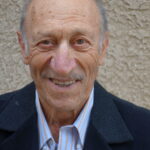
Moisey Blitshteyn (Ukraine)
I was born on May 8, 1939, in the small town of Yaltushkovo, in Ukraine’s Vinnitsa region. After my father graduated from college, he was sent to the Kordelevka Sugar Factory, also in Vinnitsa region. My family consisted of my mother Berta Blitshteyn, my father Avely Blitshteyn, my five-year-old brother Mark, and me. We moved to Kordelevka and lived there until World War II began. Before the war, both my mother and father worked at the Kordelevka Sugar Factory. My father was an agronomist and my mother was a chemist.
My father was drafted into the Soviet army right away after the war began. At that time, my mother already knew that the Nazis were killing Jewish people, so she packed our belongings and took us to the railroad station, where we found out that a train loaded with factory equipment from the Kordelevka Sugar Factory was about to leave. My mother, brother and I were able to get on that train, which was eventually hit by a bomb while we traveled. We jumped from the train and walked to the next station. We had to change trains and continue to escape the Germans for about a month. We went through cities like Fastov, Kiev, Konotop, Bryansk, Orel, Lypezk, and Gryanzi. In the middle of July 1942, we arrived in Novopokrovsk, in Russia’s Tambovsk region. I have very vague memories of this time because I was very young.
In 1942, as the Nazis approached Tambov, we had to get on yet another train and move to the Southeast. We were on that train for a long time before we arrived in Yangy-Ul, a town in Uzbekistan’s Tashkent region. I remember that we were put in a cotton barn where dividers had been installed that allowed each family a small area to live in. It was very tight and beyond uncomfortable. Nobody liked refugees, so we always got dirty looks.
My mother still worked as a chemist at a Sugar factory. There was no food, and my mother worked all the time in order to feed us. She ran our household and took care of us (my brother and I) without any help. I still don’t understand how my mother managed to do everything. Her sister came to Yangy-Ul later and stayed with us.
We lived in Uzbekistan until the war ended. We lived with no furniture and no plumbing. There was very little food. I remember that there was a fruit garden next to where we lived, and that there were rotten apples lying on the ground under the apple tree. One day I tried to get an apple, but the garden’s watchman, who was riding a horse, whipped me.
After the war ended, my father, who was at the front the whole time, joined us and our family went back to Ukraine. This was in 1946. Once again, we rode for a long time on trains. At that time, trains did not have specific schedules so we had to stay at train stations and wait. We were starving. My father once brought us a honey cake. It was big and sweet. I still remember the taste of that cake!
Before the war, when my parents worked at the sugar factory, the factory gave us an apartment to live in. But when we came back to our apartment after the war there was nothing in it. All of our belongings were gone. Luckily, someone found our wall clock and some furniture to give to us. Later, my parents found out that my grandfather was killed by the Nazis, along with many other Jews. Besides my grandfather, all of my family members survived the war.
After the war, I finished school with the highest honors, but because I was Jewish I didn’t get the gold medal (special award for educational achievements) for all my hard work. One of my grades was intentionally lowered and the medal was given to a Ukrainian girl.
I went to Kharkov, Ukraine, and applied to a University there. A woman at the university informed me they didn’t take students with my last name. I took my paperwork and left. My desire to study was strong so I applied to a Chemical-Mechanical College, where I was accepted. After college, I worked as a stonemason in Kharkov, then applied to Kharkov National University in their Building and Architecture department. Immediately after I was accepted I was drafted into the Soviet Army, but I was released early so that I could continue my education. I met my future wife Zinaida in 1967, at a student competition. We got married in 1968. We have three children, Polina, Yulia and Maxim.
Our daughter Yulia immigrated to Tucson, Arizona in 2002, and we joined her later that year with Polina and her family. Our son Maxim lives in Germany.
